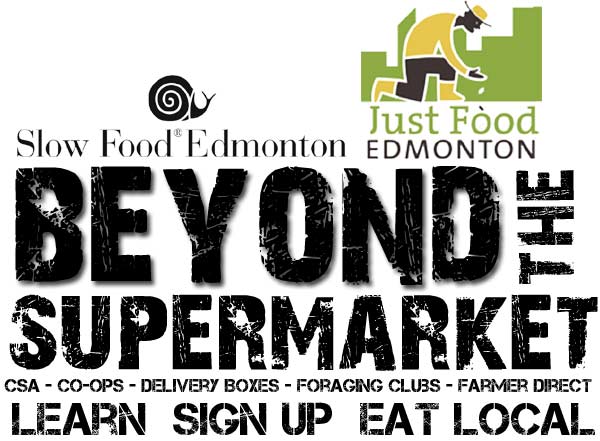Aka: From Manure to Milk to Music (the title of Michael’s future book, should he ever write it)
Slow Food International’s position on raw milk can be found here.
Michael Schmidt has it all figured out. Amongst the insanity of a system that once stripped him of his life’s work, he has found his place. And his place is one that few could find. Or stand in.
Engulfed in his open welcoming hug, it was impossible not to be affected by the positive passion of this big, strong farmer who has become the Canadian advocate for raw milk.
He was in Edmonton on February 23, 2011 to provide support to Judith as she faces the charge of selling raw milk. In our country, the penalties for the sale of raw milk are serious. I would equate them to that of a serious drug dealer. This day, Schmidt not only came to show his support, but he presented information to the court about raw milk and the current dairy farming industry in Canada. He is not here for Judith, per se, he is here to support and advocate for “food freedom” and the right for people to choose what they buy and eat. He asks that we do the same.
March 23 is the next court date, and Michael Schmidt will be here again, from his Ontario home, to show that same support. Slow Food Edmonton will host his presentation at the Edmonton Public Library from 7 to 8:30 that evening. Michael will present information about this issue to the public.
I left this first meeting knowing I had met a Canadian hero. Michael Schmidt is a hero in modern times as he has created profound change and provided undying support and commitment to this cause with wit, humor, passion and most definitely a song in his heart.
One year older than I, born in 1954 in Germany, he determined his destiny at 16. “There will be thousands of great positions in the future, but hardly any great farmers. “ was his impetus. It was farming, or music. He also had his firs orchestra at 16. At 23 he owned his first farm, at 24 he acquired his master’s degree in agriculture and organized his first cow share.
Moving to Canada in 1983, he started his own biodynamic farm. In Germany, there were raw milk dispensers in the schools. But he found in the “freest county in the world” the most severe laws against the most natural and wholesome product. Why?
He has an explanation. It is the same as our governments, and it makes sense for the industry in general, but not for the small dairy farmer. In brief: from 1918 to 1933 over 700 people died from a cause determined to be acquired through pathogens in their milk. In 1938 pasteurization was mandatory and in 1981 a Canadian law. In Michael’s words, “…is still absolutely necessary for their milk.” And who are “they”? The dairy industry.
He explains. About 10% of milk produced from industrial dairy farms today is infected with pathogens that can be destroyed through pasteurization. Because the milk from industrial farms is mixed together, pasteurization works in this situation for that purpose. But not all dairy farms are “industrialized”. Yet, this law is a blanket law.
Michael provided a chart where he estimated the following totals:
1. At the beginning of time
• 1500 liters of milk was produced by a cow to raise a calf in a year
2. Humans developed a relationship with the cows
• 2500 liters of milk was produced by a cow for the calf and the people in a year
3. Through breeding and husbandry
• 3500 liters of milk was produced by a cow in a year
4. Production now is 3 times more than it was 20 years ago
• 20 000 liters of milk is now produced by a dairy cow in a year
How is it possible to get so much milk from one cow? Through science and technology man learned that changing the natural diet of a cow (feeding a cow dense proteins) would produce more milk.
What are the consequences of this? If the life energy of one cow only supports an output of 4500 liters of milk a year and is then “pumped full of proteins” to enable greater production, this creates poisons within the system of the animal. “The organ becomes detoxified and that activates pathogens because of the stress on the system.”

Therefore, “their” milk must be pasteurized, as this is what industrialized dairy farmers are doing to their animals. But, Michael does not do that to his animals, and many small dairy farmers do not, either.
The life span on one Holstein under this kind of pressure to produce this much milk is 2.5 production years. Michael has cows that produce and average of 10 years. Some are 15 years old and still producing.
The thousands of breeds of dairy cattle that once existed now numbers about 5. Diversity no longer exists in the industry. The kind of beautiful cheese that the milk from a Holstein used to be able to produce is no longer possible with this milk from this breed of Holstein. There are now only about 10 000 dairy farms across this vast country. In Michael’s words, “An entire [way of life] has been destroyed by this corporate culture.” Michael’s own cows now produce about 3 500 liters of milk a year, and that is enough. His milk should not be classified in the same manner as that of an industrialized farm. The consumer should absolutely have the right to decide if they want to drink raw milk or industrialized milk. We need to stand together to fight for food freedom.
And there are definitely politics involved as our industrialized milk is still contaminated. John’s Disease is of grave concern to the dairy industry and the best kept secret from the public, according to Schmidt. Johne’s is a Tuberculosis bacterium that destroys the large intestine and creates diarrhea in the dairy cow. The cell membrane of this pathogen is too thick to be destroyed through pasteurization so even industrialized government sanctioned milk contains this live and dangerous pathogen. There is mounting evidence of the rise in Crohn’s disease in humans and Johne’s disease in cattle, though some Bovine Veterinarians will argue it has not been proven. And, Schmidt adds, the veterinarians are very closely working with industrial dairy farms. In Canada, did you know that veterinarians are not allowed to test cows for tuberculosis? What could possibly be the reasoning behind this? Schmidt explains it is because this test would reveal Johne’s disease and if the herds infected with Johne’s disease were destroyed in Canada, our dairy industry would collapse. This is a very serious issue. He adds, “If the truth comes out about how bad (industrialized] milk is the dairy industry would collapse. The milk we now buy that is government sanctioned is not safe.”
Michael Schmidt has developed Cowshare Canada and accompanying it is a set of standards that must exist to enable the safe sale of raw milk.
How did Michael find this place from which he stands? In 1994 Michael’s 600 acre biodynamic farm was raided. He had over 40 cows shared with 150 families. “At that time, we were lost in the wilderness with zero support…. We lost 500 acres of land with legal fees and crooked lawyer. In 1995, we had 3 cows left, 100 acres and did not know how to pay our bills. We had food because we lived on a farm.“
Not being able to appreciate a gorgeous sunrise, head down, emotionally devastated and thinking, “My life’s work was completely destroyed.” He was literally struck by his own ferocious bull and thrown thirty feet in the air. His life saved by his dog, and screaming wife, Michael climbed out of his hospital bed and rose from the depression and helplessness that had engulfed him. He saw what himself in the horns of his own bull as the sun between the horns of the Egyptian Bull God, Apis that symbolizes rebirth. What do I do now? I start again. Of course.
And he did. With his three cows and his 100 acres. His entire herd now is completely inbred. For over 20 years, no new blood has been introduced to his herd. This is how local breeds were originally developed eons ago. This kind of strong breed has enabled him to “make my milk medicine. Food must be medicine. “
Through “the tragic reality out of the first milk war in 1994 most would have given up, and in 2006 we had our next raid. This time we raised 100 000 dollars within weeks. The support was there. We only missed one shipment of milk during this entire process. We were back to work immediately. I received a fifty five thousand dollar fine and four years later was cleared of all charges.” This was ground breaking and in Ontario, Michael Schmidt carries on his cow share business now without the worry of another raid on his farm.
But he takes no credit for this victory. He gives the credit to his judge as he claims that his man understood him and when he read his verdict in court he stated repeatedly that this was a man that is honest with integrity that has remained constant in his struggle.
He told his judge that music saved his farm. To raise some of the money he needed, he held two symphonies in his barn. His orchestra preformed Haydn’s Creation, interwoven with the creation music of a First Nations band. “This judge understood that food is more than just about eating. This is not a battle with which I won. The issue is truth. I didn’t need to have any legal strategic argument. Truth runs through consistency in one’s life. The judge saw this in mine.”

And we all saw it as we listened to Michael Schmidt on Wednesday evening this week. This is not only a man who walks his talk; this is a man who flies across the country at his own expense to fight for food freedom.
He asks that we stand together to fight for food freedom. “People need to come out in the open and be seen in Alberta to get this passed.”
Please mark March 23rd 2011 on your calendars. Standing shoulder to shoulder with Michael Schmidt is a very honourable place to be.



